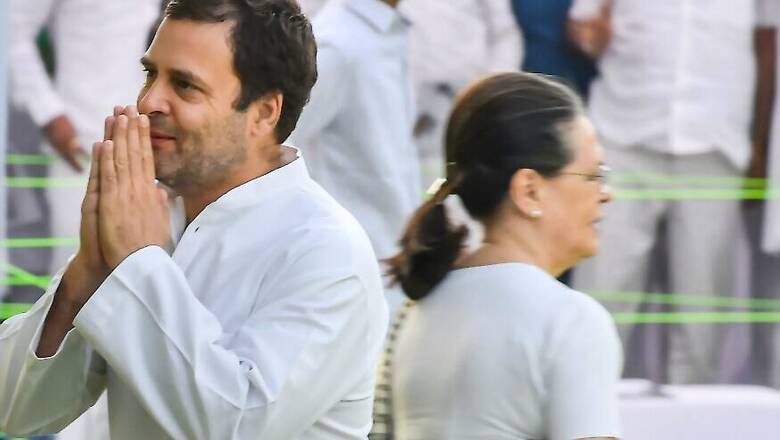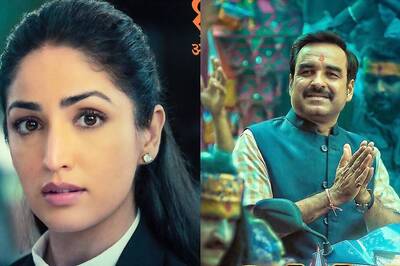
views
Former President Pranab Mukherjee's much-talked-about visit to the RSS headquarters in Nagpur has brought to the fore an intense debate in the Congress on whether or not the Grand Old Party should follow political untouchability in public life.
There is a sharp divide in the party, with a section of leaders contending that the ‘leopard cannot change its spots’ and therefore the saffron forces needed to be fought off in the best possible manner.
Another section feels that the party is harming its own cause by constantly targeting the RSS, which has developed deep roots in society since its inception 90 years ago and needs to be engaged with intelligently and innovatively.
The churning has begun at a time when the Lok Sabha elections are not far. There is an acknowledgment in a section of the Congress, as also other opposition parties, that the RSS helped Narendra Modi in a major way to reach out to people in 2014 and become the first BJP leader to achieve the unique feat of securing majority.
It must be recalled that the Congress attack on the RSS has sharpened since the late 1980s when the Ayodhya issue led to the BJP's revival and posed a threat to the party not only in the Hindi heartland but also at the Centre.
In fact, the Congress's decline began from the Ayodhya issue. Coupled with it, the Mandal movement not only cut into the Grand Old Party’s social base, but also strengthened regional parties in Uttar Pradesh, Bihar, Haryana and Jharkhand. It benefited the saffron party when it promoted the OBC leadership strategically.
The Congress did not realise the twin dangers as it was sure that the road to power goes through the Gandhi-Nehru dynasty. Jawaharlal Nehru, Indira Gandhi and even Rajiv Gandhi in his early years did not feel threatened by the RSS. It is not the case under Sonia Gandhi and Rahul Gandhi.
Technically, Pranab Mukherjee does not belong to any party, but the second-rung leaders in the Congress, active in the AICC headquarters and Parliament, opposed his visit openly while former prime minister Manmohan Singh, Sonia Gandhi, Rahul Gandhi and other senior leaders chose to stay away from the controversy perhaps as a strategy.
But the panic reaction in the vocal section of the Congress brought the spotlight on the RSS, which got huge publicity across the country.
Now, the Congress insiders are asking whether it is correct to consider the RSS as ‘untouchable’ and whether it will help the party politically.
“We should be bitter and harsh to the RSS, its communal and divisive ideology and oppose it openly on all fora. But will it be wise to stop a dialogue with it? Is it feasible and possible when the Sangh Parivar has been expanding all over the country?"
A former Union minister poses this question: If the BSP, the Janata Parivar (JD-U, JD-S, Lok Janashakti Party), TDP, Dravidian parties (DMK, AIADMK, PMK, MDMK), Trinamool Congress, Rashtriya Lok Dal, Indian National Lok Dal and AGP shared power with the BJP, the political front of the RSS, and still remain secular, then why should the Congress believe in practising political untouchability?
The section that pitches for fresh thinking on RSS contends that the Congress has never disputed claims of the Sangh support in the 1984 Lok Sabha elections held in the wake of Indira Gandhi's assassination, which had brought down the BJP's numbers to a mere two in the 543-member Lok Sabha. The Congress got more than 400 seats.
"The RSS should be banned if it is working against the national interest, but one cannot stop dialogue with the organisation on the grounds that it has strong views with regard to minorities. Declaring the RSS as the enemy number one ideologically could lead to the Congress' alienation from the majority community," says a leader.
Although different Congress governments at the Centre banned the RSS three times, Indira Gandhi and Rajiv Gandhi did not stop dialogue with key RSS leaders, this section says.
They feel Congress president Rahul Gandhi should be bitter to Prime Minister Narendra Modi and the BJP in his attack, but what is the point in antagonising the RSS, especially when its chief Mohan Bhagwat has openly rejected Modi's idea of ‘Congress-mukt Bharat’.
The Congress has to decide whether it should follow the ultra-secular line or the middle path. But more importantly, it has to identify who are its core voters. Right or wrong, but by inviting Pranab da to Nagpur, Mohan Bhagwat has succeeded in kicking off a churning in the Grand Old Party. Rahul Gandhi just cannot ignore the issue.
(The author is a senior journalist. Views are personal)




















Comments
0 comment